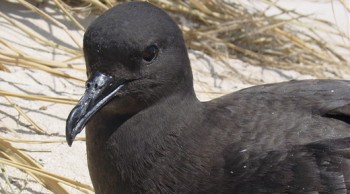
Christmas Shearwater, from the US Fish & Wildlife Service
NOTE: Today is Day Two of “WADWEEK2024”, a series of seven daily posts to ACAP Latest News leading to World Albatross Day on 19 June, in support of this year’s theme of “Marine Protected Areas – Safeguarding our Oceans”.
Jennifer Lavers and Alexander Bond (Bird Group, Natural History Museum, Tring, United Kingdom) have published in the Marine Pollution Bulletin on plastic loads in Christmas Shearwaters Puffinus nativitatis in the South Pacific.
The paper’s abstract follows:
“Marine protected areas (MPAs) are an important conservation tool for species and habitats; however, they are not a panacea solution. For example, MPAs provide little protection from plastic pollution which travels vast distances on ocean currents. Here we document exposure of juvenile Christmas Shearwaters (Puffinus nativitatis) to plastics on uninhabited Ducie Atoll in the remote South Pacific. Despite being surrounded by the very large Pitcairn Islands MPA, most birds (68.7 %; n = 16) contained 3.8 ± 4.1 pieces of ingested plastic. Unexpectedly, the number, mass and frequency of occurrence of plastic in two age classes (young downy chicks and fledglings) was similar. While the reason for this is unknown, it may suggest birds do not acquire new plastic items, or are able to rid themselves of plastics, beyond a certain age. We discuss the potential health consequences of plastic ingestion in Christmas Shearwaters and call for further research of this poorly studied species.”
"Plastic Pollution" was ACAP's theme for World Albatross Day last year.
Reference:
Lavers, J.L. & Bond, A.L. 2024. Beyond the surface: seabirds and plastics as indicators in a large, remote marine protected area. Marine Pollution Bulletin 205. 116574.
14 June 2024

 English
English  Français
Français  Español
Español